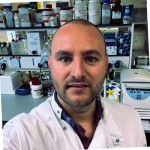

Infection and cellular biology
Research theme aim: To understand fundamental and mechanistic cellular processes revealed through infection biosciences.
Exemplar project: Cross-species regulation of coronavirus infection by m6A RNA methylation
Research projects and students

Using Marek's Disease Virus to understand the RNA world of alphaherpesviruses
Sophie Cutts
Supervising institutes: University of Surrey; The Pirbright Institute
About Sophie
What do you enjoy most about your PhD?
My PhD focuses on Marek's disease virus, a highly pathogenic virus of chickens, with an emphasis on understanding the activity of the virion host shutoff protein, a protein that is conserved across the alphaherpesvirus family. Partnering with both the University of Surrey and The Pirbright Institute allows me to conduct my research in both an academic and institutional setting, providing valuable opportunities to collaborate with a diverse range of researchers. This also offers extensive training opportunities to enhance my scientific development and broaden my knowledge.
Could you share details of the journey that led to your PhD, including any experiences (professional, personal or educational) that have helped shape that path?
Before beginning my PhD, I completed my BSc (Hons) in Bioveterinary Science at the University of Lincoln. During my final year, I had the opportunity to develop a research project investigating the antimicrobial activity of plants, specifically garlic, as an alternative to antibiotics against endemic livestock bacteria. My research interests have centred around bridging the gap between human and veterinary medicine using a One-Health, One-Medicine approach. Owing to this, I then pursued an MSc by Research under the guidance of Dr Ashley Roberts at the University of Lincoln where I developed a recombinant baculovirus system to study protein-protein interactions in feline and equine herpesviruses, and, by using an in-silico approach, identified highly conserved regions to target as cross-species drug targets across the alphaherpesvirus family.
Supervisors
- Professor Gill Elliott (University of Surrey)
- Professor André Gerber (University of Surrey)
- Dr Yongxiu Yao (The Pirbright Institute)
- Professor Venugopal Nair (The Pirbright Institute)

Identification of receptors for Venezuelan equine encephalitis virus in macrophages
Daniel Simpkin
Supervising institutes: University of Surrey; Defence Science and Technology Laboratory (Dstl)
About Daniel
What do you enjoy most about your PhD?
The best part of my PhD is that I find the project interesting. I am trying to determine which receptors bind to viral proteins from VEEV. I enjoy both learning about how the immune response reacts to pathogens, as well as the pathology of alphavirus. I am also fascinated by how scientific methodologies and innovative techniques are employed to test our hypotheses. I also enjoy conceptualising new ideas and testing these in the lab, such as testing a vaccine candidate that I have co-designed for antigen expression.
Could you share details of the journey that led to your PhD, including any experiences (professional, personal or educational) that have helped shape that path?
The primary reason I signed up for a PhD was because I enjoyed pushing the boundaries of human knowledge. I found this during my undergraduate placement in Sweden, where I was exposed to different cell culture techniques, and gained experience in operating various scientific instruments. The experience of conducting experiments that had never been attempted before was thrilling. Analysing these results and coming up with new ideas is what I really enjoyed and it inspired me to pursue research as a career. A PhD is part of that journey for me to become the best researcher I can and it allows me to contribute to the advancement of science and further expanding human understanding.
Supervisors
- Dr Fernando Martinez (University of Surrey)
- Professor Christine Rollier (University of Surrey)
- Dr Thomas Laws (Dstl)

Antigenic and molecular studies of highly pathogenic viruses
George Hooper
Supervising institutes: University of Sussex; The Pirbright Institute
About George
What do you enjoy most about your PhD?
One of the aspects I have enjoyed most during my PhD is immersing myself in a long-term lab project, which has allowed me to develop my research skills and see meaningful progress over time. I have particularly valued the opportunities for collaboration between labs and institutions, as they have broadened my perspective and enriched my research experience. Additionally, sharing my work at conferences and events has been incredibly rewarding, enabling me to engage with the wider scientific community and receive valuable feedback on my research.
Could you share details of the journey that led to your PhD, including any experiences (professional, personal or educational) that have helped shape that path?
My journey to a PhD began with a career in sales, where I realised, I wanted a more rewarding and meaningful career. This led me to pursue an integrated masters degree in biomedical science, driven by my passion for science and desire for a hands-on role. During my degree, I discovered an enjoyment for laboratory work. Inspired by these experiences and eager to deepen my knowledge, I applied for PhD opportunities, excited to contribute to scientific advancements and further develop my research skills.
Supervisors
- Dr Edward Wright (University of Sussex)
- Dr Chris Netherton (The Pirbright Institute)

Dissecting the molecular mechanisms of flavivirus translation
Adrianna Tubb
Supervising institute: University of Surrey; The Pirbright Institute
About Adrianna
What do you enjoy most about your PhD?
I enjoy the extra push The Pirbright Institute gives me, as well as the extra opportunities for training and access to resources I have through the partnership. There is a nice sense of community with other PhDs, both on the DTP but also with other students at Surrey and Pirbright. I have also collaborators, both nationally and internationally, which has enabled me to develop invaluable connections I may not have been exposed to in a different PhD.
Could you share details of the journey that led to your PhD, including any experiences (professional, personal or educational) that have helped shape that path?
Straight after an undergraduate degree in Biomedicine, I continued studying by completing an MRes at Royal Holloway university in Molecular Neuroscience. At this point, I realised that I loved the molecular aspect to my Masters, but I wanted to get more experience in a different discipline, and also research lab. I wanted to pursue a PhD in a research institute setting rather than a university-based setting, as this would set me up for the future.
Supervisors
- Dr Trevor Sweeney (The Pirbright Institute)
- Professor Nicolas Locker (The Pirbright Institute)
- Dr Lindsay Broadbent (University of Surrey)
- Dr Dany Beste (University of Surrey)
The role of African Swine Fever virus core proteins in the nucleus in the early stages of replication
Ashleigh Tungate
Supervising institutes: The Pirbright Institute; University of Surrey
About Ashleigh
What do you enjoy most about your PhD?
My PhD includes a wide range of techniques including molecular cloning, immunofluorescence, and next generation sequencing. There are many chances to learn and build on both lab skills and employability skills, helping to set up the foundations for my future. The PhD allows me to network with people from many different backgrounds and topics, enhancing my knowledge of so many aspects of science.
Could you share details of the journey that led to your PhD, including any experiences (professional, personal or educational) that have helped shape that path?
I studied a Master of Biosciences in Bioveterinary Science degree at the University of Lincoln before starting my PhD.
Supervisors
- Dr Chris Netherton (The Pirbright Institute)
- Lynnette Goatley (The Pirbright Institute)
- Professor Gill Elliott (University of Surrey)
- Professor Carlos Maliquer de Motes (University of Surrey)

Understanding bacterial metabolism to develop
James Bailey
Supervising institutes: University of Surrey; UK Health Security Agency (UKHSA)
About James
What do you enjoy most about your PhD?
My project explores propionate metabolism in Mycobacterium abscessus, combining mutagenic, metabolomic, and cell-culture based assays to understand the pathways that bacteria use in host-relevant conditions. I have found it really exciting to be able to independently explore this novel research area. The cross-institutional nature of the DTP has offered a unique and exciting opportunity to access a wide range of facilities and expertise across both academic and public health institutions. It has been great to get to know the other DTP students and share the experience as a supportive cohort.
Could you share details of the journey that led to your PhD, including any experiences (professional, personal or educational) that have helped shape that path?
Before starting my PhD, I completed a BSc in Biology at the University of Bath. As part of this, I had the opportunity to spend a year at the UK Health Security Agency, where I researched non-tuberculous mycobacteria. Not only did this experience confirm my passion for independent research, but it also allowed me to develop a genuine interest in mycobacteria - an area I am excited to continue exploring throughout my PhD.
Supervisors
- Dr Dany Beste (University of Surrey)
- Joanna Bacon (UKHSA)

Role of MICL in SARS-CoV2 Infection
Chloe Legge
Supervising institutes: University of Exeter; UK Health Security Agency (UKHSA)
About Chloe
Supervisors
- Gordon Brown (University of Exeter)
- Kathryn Ryan (UKHSA)

Applying systems thinking methodologies to improve one health approach outcomes and impact
Hannah Kenway
Supervising institutes: University of Surrey; Animal and Plant Health Agency (APHA)
About Hannah
What do you enjoy most about your PhD ?
I love the fact that my research problem is relevant and applicable to real world problems. Working in a transdisciplinary field has opened my eyes to a diverse range of research methods and world views and has led me to question my own assumed objectivity. I have already collaborated with people from many different disciplines and am consistently challenged and inspired to think differently, to hold space for diverse perspectives and notice the hidden connections that drive many of the outcomes in One Health and beyond.
Could you share details of the journey that led to your PhD, including any experiences (professional, personal or educational) that have helped shape that path?
I have been a vet in farm animal practice since 1993 - alongside a role as a lecturer at Surrey University Vet School and a consultant in sustainability within the veterinary sector. A PhD was not something I'd really considered - I have a large family and went straight from university into practice- working in the UK and abroad. Having worked in the countryside for my whole career and delivered projects for government and industry, I was very aware of the unintended consequences of many policy decisions and the complexity of the global systems in which I was operating.
I authored two training courses for vets, around sustainability in agriculture and livestock emissions and during that process was asked to contribute a chapter on leadership and behaviour change. Through that process I began to realise that imparting knowledge "onto" farmers was unlikely to deliver long term meaningful change in practices and started to explore some of the hidden drivers that may be driving poor outcomes at a farm and a policy level.
A PhD was not something I'd considered at this stage in my career, but a discussion with fellow academics around the coffee table inspired me to apply for this project and I was very happy to be offered the studentship. Many of my professional and personal roles and interests are directly applicable to this exciting project and I am very much looking forward to working with groups of stakeholders to deliver a project that I believe will have the potential for real positive impact in One Health.
Supervisors
- Dr Elizabeth Mumford (University of Surrey)
- Emma Snary (APHA)

Understanding the molecular mechanisms of Vibrio species that present a risk to humans and marine ecosystems
Oliver Cubberly
Supervising institutes: University of Surrey; UK Health Security Agency (UKHSA)
About Oliver
Supervisors
- Dr Jennifer Ritchie (University of Surrey)
- Claire Jenkins (UKHSA)

Visualising effective and dysregulated immune responses to virus infection
Jack Sands
Supervising institutes: The Pirbright Institute; University of Surrey
About Jack
Supervisors
- Dr Jane Edwards (The Pirbright Institute)
- Professor Falko Steinbach (University of Surrey)

Environmentally driven immune disfunction and its consequences for response to fungal pathogens
Zara Baker
Supervising institutes: University of Exeter; UK Health Security Agency (UKHSA)
About Zara
Supervisors
- Dr Eduarda Santos (University of Exeter)
- Miriam Jacobs (UKHSA)
